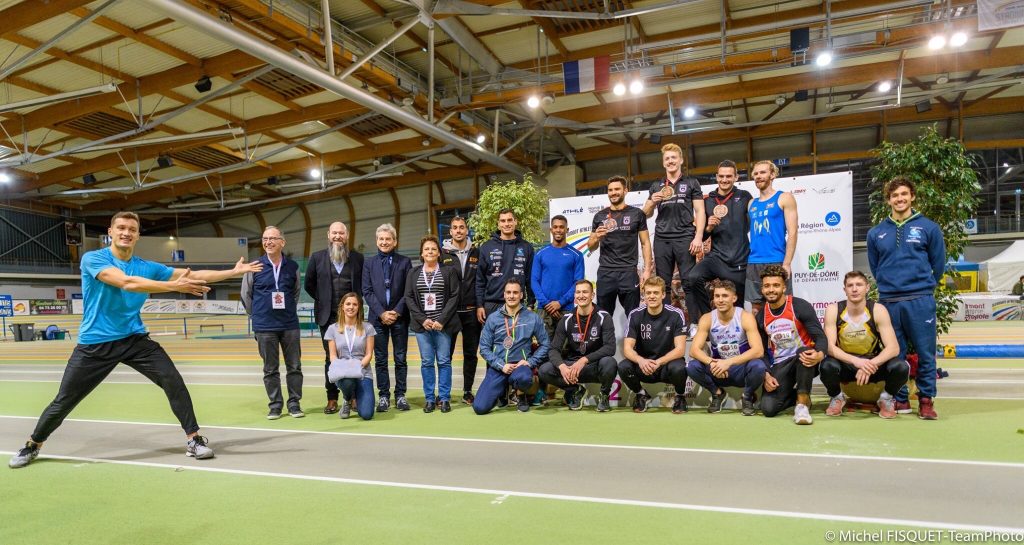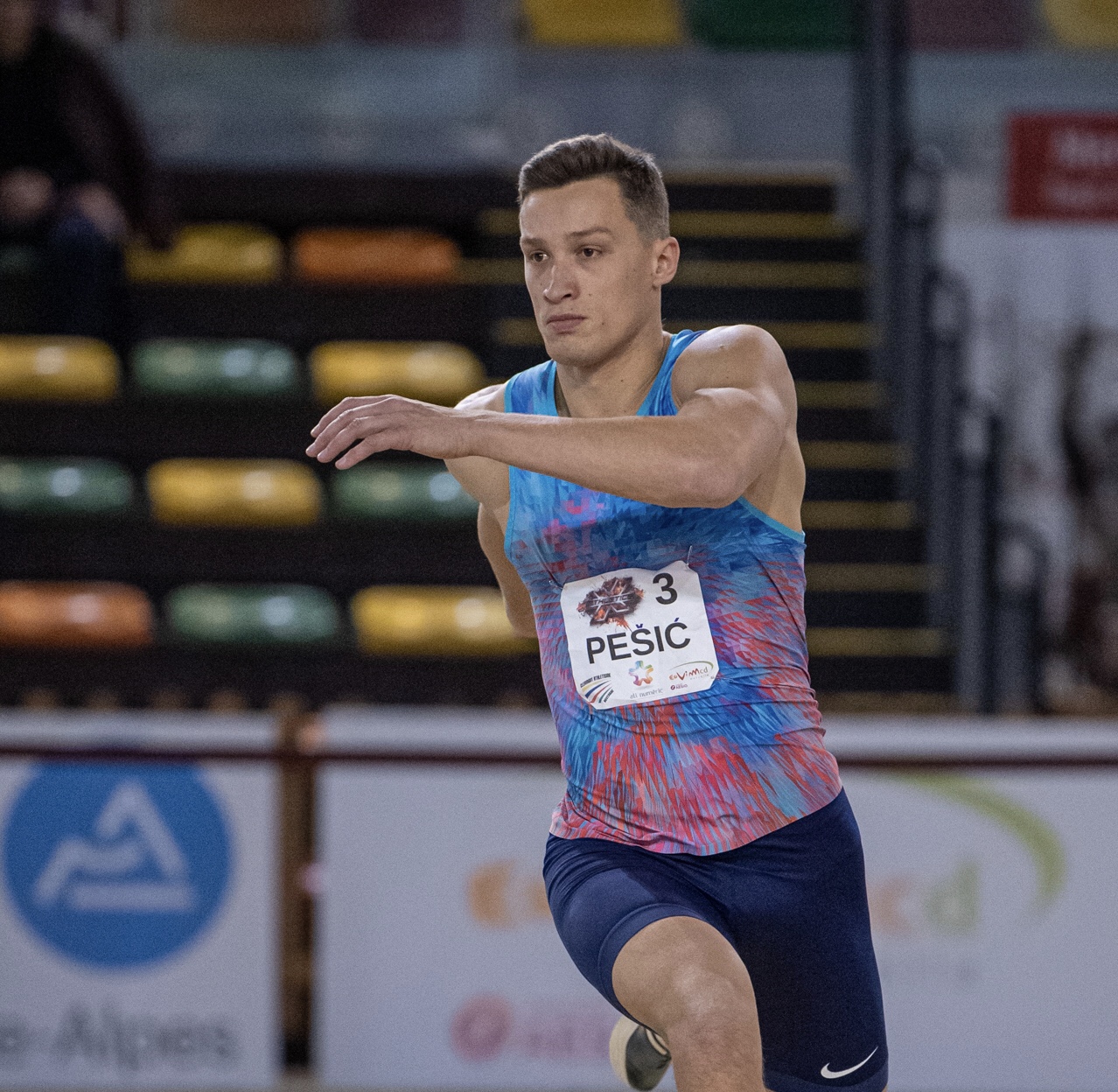The world has been plunged into chaos by the spread of coronavirus. Meetings are cancelled. The Olympics have been postponed for a year. Entire countries are in lockdown for the foreseeable future. But few athletes are better equipped to cope with the need to be self-sufficient than Montenegro’s finest, Darko Pešić.
Growing up in one of World Athletics’ newest member federations, without the sort of facilities taken for granted in Germany, France and other great combined event nations, Darko is used to being creative to find a way to train.
“When I was young, we had no stadium. So, we just threw everywhere, anywhere we could. We took the cannonballs from old SSR tanks and that was our shot put. I think that’s why I’m good in throwing events! Our discus also came from old SSR stuff. For javelin, we used broomsticks, and then we had an old SSR aluminium javelin. My coach had to put something pointed at the end of the javelin so that it would stick in the ground. There was a small room in our school, with a very small mattress, where we did the high jump. We had old stands, but our bar wasn’t a bar – it was a metal curtain rail. Our backs would hurt so bad! But I’m ok at high jump (Darko’s PB is 2.01) and Marija Vuković trained with me, and she became world junior high jump champion (Moncton, 2010). Even if we had to improvise, we did what we could, and we did it full time.”
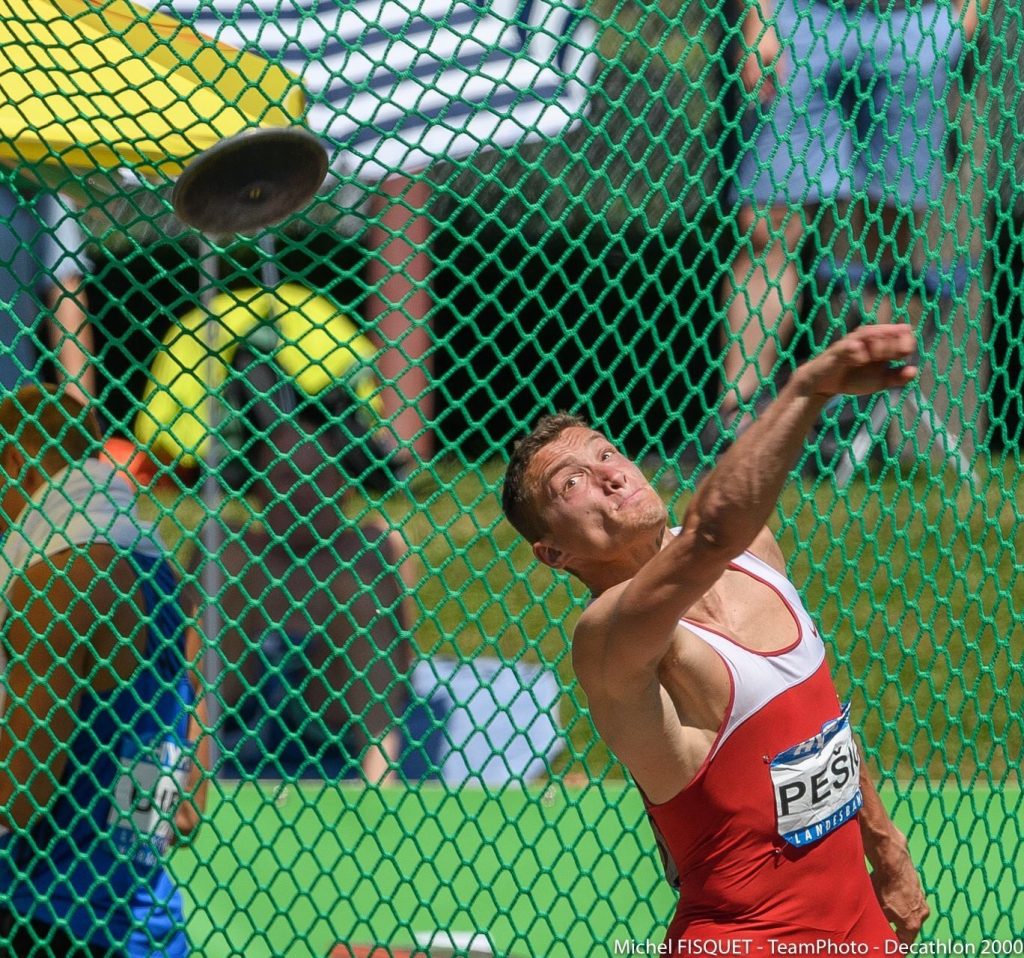
Darko was attracted to combined events in part because of his versatility, but also to learn those events he had not been able to do at home. He didn’t have access to a long jump pit, so he wanted to long jump. No pole vault pit, so he wanted to vault. No hurdles, so he wanted to hurdle. When he moved to Serbia to train for the first time, it was a leap of faith.
“I thought I could be a good athlete when I started in 2011. But it took me until 2017 to prove to myself that I was good.”
“YOU ALWAYS COME BACK”
Darko currently trains in Novi Sad, in Serbia, with Goran Obradović. Goran has been coach to Olympic long jump bronze medallist Ivana Španović for some time, and 2016 European decathlon bronze medallist Mihail Dudaš. After periods moving around Europe, Darko always seems to find himself back in Novi Sad, and back with Goran. You might think that he has a strong sense of wanderlust, but actually the opposite is true.
“In 2011 I moved from Montenegro to Novi Sad, to train with Goran. I was with him until 2015. Then I moved to Sweden and did a year there. I came back to Goran, and I did well in the European Indoors in 2017. But a mall was being built in Novi Sad and our throws area was destroyed. I had to travel to another city to throw, and so I couldn’t throw so much. So, I moved to Prague.”
In the Czech Republic, Darko joined the training group led by Josef Karas, two-time Czech decathlon champion. The group included 2016 European Championships silver medallist Adam Sebastian Helcelet, Marek Lukáš and Latvian international Reinis Krēgers.
“I liked working with Josef, and I liked the plan. But because of visa issues I couldn’t stay. I like to be in one place. It’s ok if I have to travel to a training camp or competition, but I don’t like counting how many days I have to stay somewhere else in Europe. Now I’m back with Goran in Serbia. ‘You always come back’, he always says to me.”
ONLY DREAMS, NOTHING ELSE
Darko’s experience transitioning from junior to senior ranks was very different from those athletes he lined up against at the European Juniors in Tallinn in 2011, and again at the European U23 Championships in 2013. They included the likes of Kevin Mayer, Mathias Brugger, Martin Roe, Karl Robert Saluri, Niels Pittomvils.

“I felt I was always reading about them, while I was dreaming about competing. But when you come from a country with few facilities, where you don’t have a lot, all you can do is dream. Only dream, nothing else. That’s the worst thing.”
“I thought that the Germans, the French: that they had everything. I remember when I first met Reinis, he jumped 2.07 in the high jump, and I thought – this guy probably has everything too. But last year, I figured out that he had some facilities in Latvia, but it was old stuff too. But it was mostly just a dream for me.”
While Darko did have some opportunities to experience good training facilities and competition, there was always a return to earth with a bump. “One good thing is that you travel. The worst thing is when you come back! In 2018, I went to South Africa for the first time, to Potchefstroom. It was paradise. So many beautiful things about going abroad – travel, competitions, facilities, the athletes you meet…and then you come back home again!”
Darko’s first time competing for his country was actually on home soil in 2008, when he competed in the Balkan Youth Championships in Bar. In 2009, he competed at the World Youth Championships in Bressanone, Italy. Darko’s experience on the international stage grew alongside the experience of his home country in supporting him.
“Bressanone was an awkward competition. We started at Sunday at 9am, but we only arrived at 5.30! They probably thought “ah, the kid will sleep on the plane’. We were a country with zero experience. And I was terrible! I ran something like 11.8 in the 100m, 6.01 long jump, 16.92 in the hurdles. I remember every result. Terrible!”
BREAKOUT STAR OF BELGRADE
The highlight of Darko’s career so far has been the European Indoor Championships in Belgrade in 2017. He finished 6th and set a national heptathlon record of 5984, just 16 points away from 6000 points. Competing in front of his local crowd was clearly a pivotal experience for Darko, an opportunity which motivated him in the years beforehand as he struggled with injury, and an experience which has stayed with him in the years afterwards. It was also the meeting which exposed him to a wider international audience.
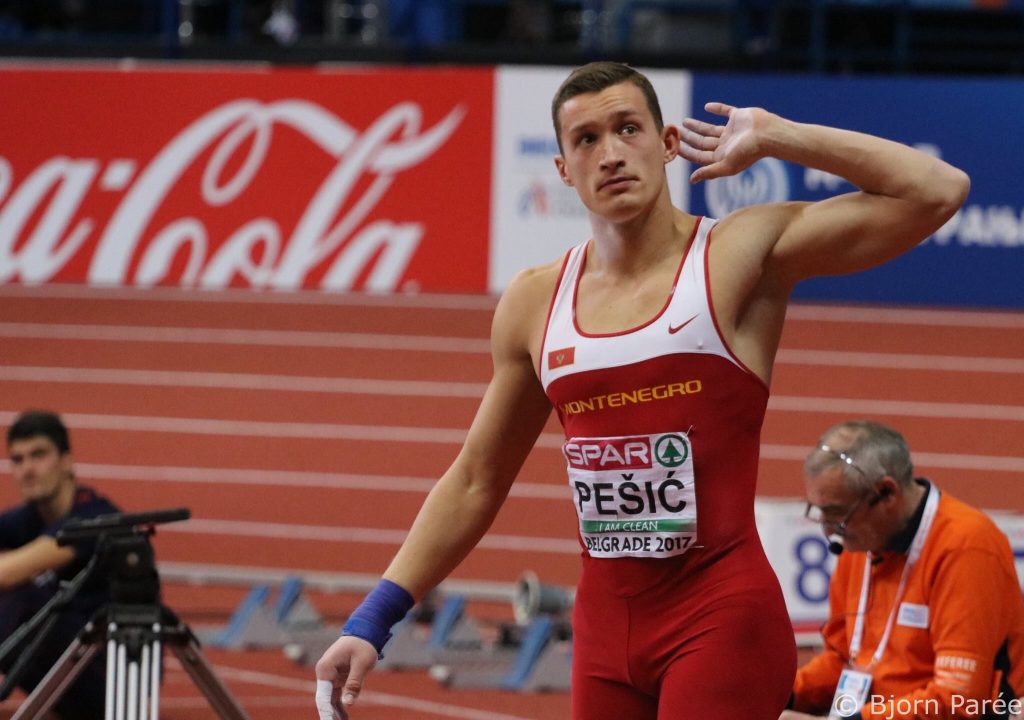
“Why did I not know about Darko Pešić before now?!” I remember one friend asking me as we watched the heptathlon from our seats in the Kombank Arena in Belgrade, working our way through a box of Munchmallows, the Serbian equivalent of Tunnocks Teacakes.
“Darko Pešić sounds like a character from the Durmstrang Institute competing in the Triwizard Tournament,” another friend mused, pondering the importance of combined events in the Harry Potter series. And we already know that Darko is handy with using a broomstick as a javelin…
While Darko may not be a wizard like his Bulgarian counterpart Viktor Krum, his magic can be found in the Montenegrin all time lists. Darko holds the national records, indoor and out, for pole vault and long jump; he holds the indoor 60m hurdles and high jump records and the 110m hurdles record outdoors. And of course, he also has the all-time best heptathlon and decathlon marks. His twin sister Danijela holds the national indoor 60m hurdles and pentathlon records. And his younger brother Dragan is also a 7200+ decathlete. The Pešić family is a multi-sibling combined events phenomenon.
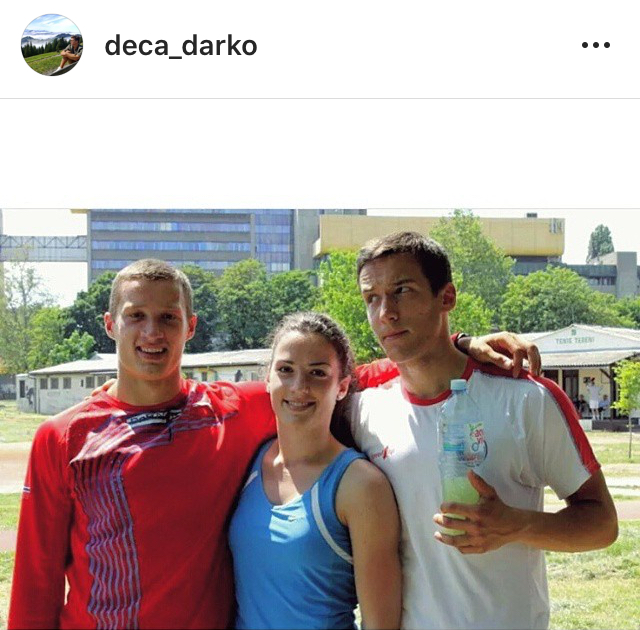
“My sister also did heptathlon, and I believe she is more talented than me and Dragan. But she stopped when she was at her best, and she doesn’t regret it. She just wasn’t hungry anymore. She did come back after three years for just one month in 2017, to run the hurdles. She ran a national record, and I said to her – you can train for the Euros, you can train for anything, because you were terrible in hurdles! She scored 3308 in the pentathlon (also a NR) and she was really happy. And so, I thought, ok, she’s going to come back! Uh-uh” he says, shaking his head. “After that? Zero. I told her, you’re only 27, but when you get to 35, you will see how you’re going to feel then…” Darko smiles, ruefully, at his inability to persuade his twin to return to athletics.
A LITTLE PIECE OF HISTORY
A few months after setting the national heptathlon record in Belgrade in March 2017, Darko matched it with the decathlon record of 7846 in Götzis in May. However, he was carrying a stress factor in his tibia at the time and aggravated it to the extent that he was unable to train for 10 months. But he had an invitation to return to Götzis in 2018. His second competition in Austria didn’t start so well, but it became memorable for very different reasons.
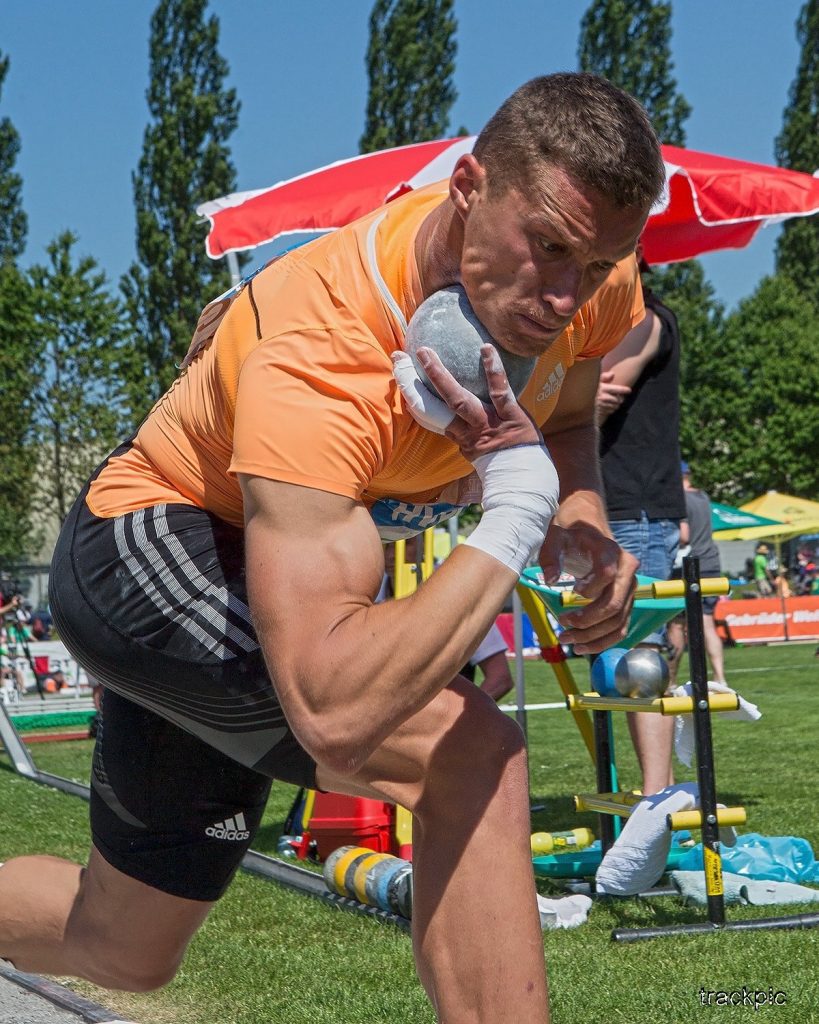
“Although I was recovering, I was still really out of shape, and I ran terrible. After the first day, Walter (Weber, Götzis Meeting Director) asked my coach Josef whether I would consider wearing a chest camera in the hurdles. I wouldn’t have considered it if I was still having a serious competition, but I thought – why not! And it was kinda fun. I actually ran well, 15.01 with a -2.0 wind, and beat some good guys while wearing a camera.”
“But when Walter brought the camera out, it was much bigger than I thought it would be. And so, the strap was really tight. My coach Josef said “Darko, I can see that you definitely need a bra. Because you are the guy with the boobs.”
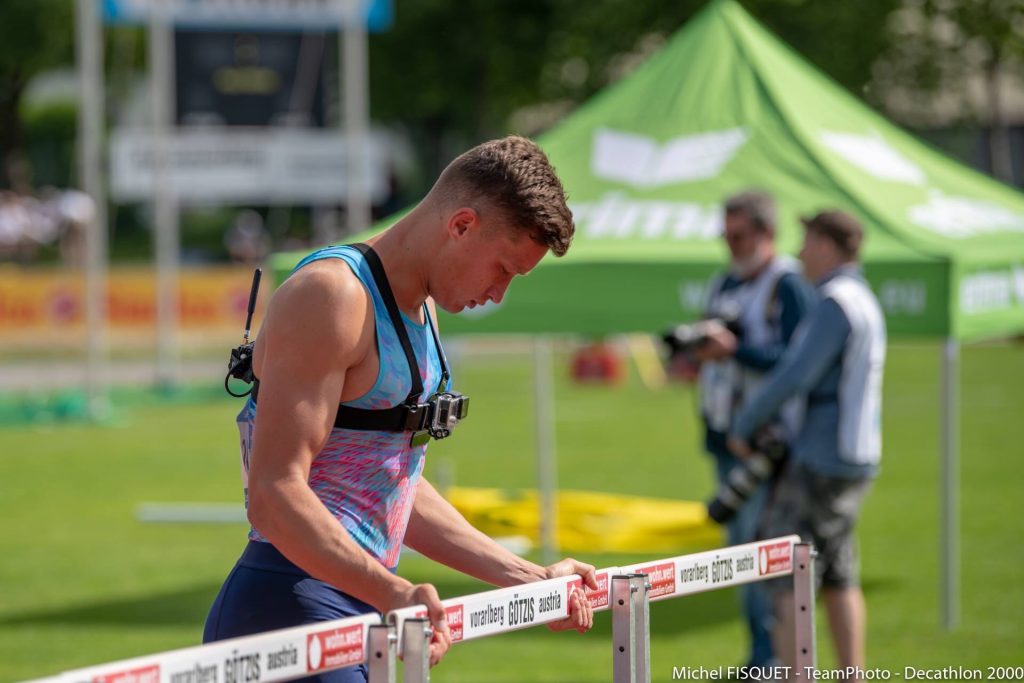
The video footage as seen from the perspective of Darko’s chest was shown on the big screens after the race, and the view is not one for those who suffer from motion sickness. “People were clapping for at least 2 minutes!” he remembers. “And afterwards they awarded me with the flash memory. It was nice to be part of Götzis history.”
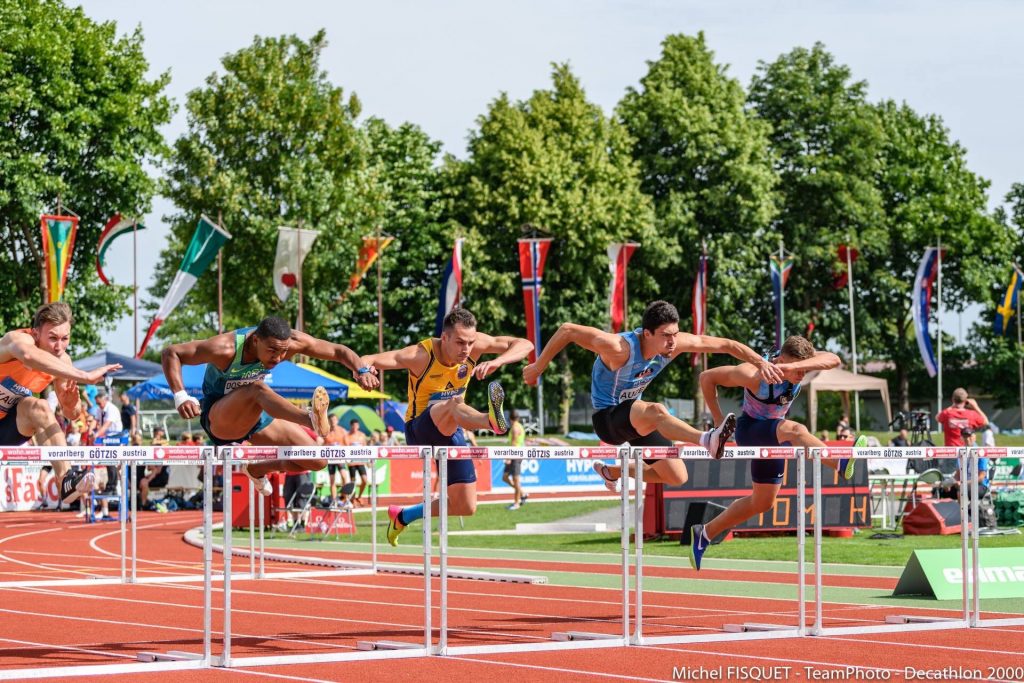
SMALL STATES AND SETBACKS
Onto 2019, and Darko suffered another setback. He lined up at the Mehrkampf meeting in Ratingen in the last weekend of June, but immediately succumbed to a hamstring injury in the first heat of the 100m. But before his season was cut short, there was the rare treat of a competition in his home country. In May 2019, the Games of the Small States of Europe took place in Bar, Montenegro. He won bronze medals in the pole vault and hurdles, as well as placing 4th in the long jump and 6th in the high jump.
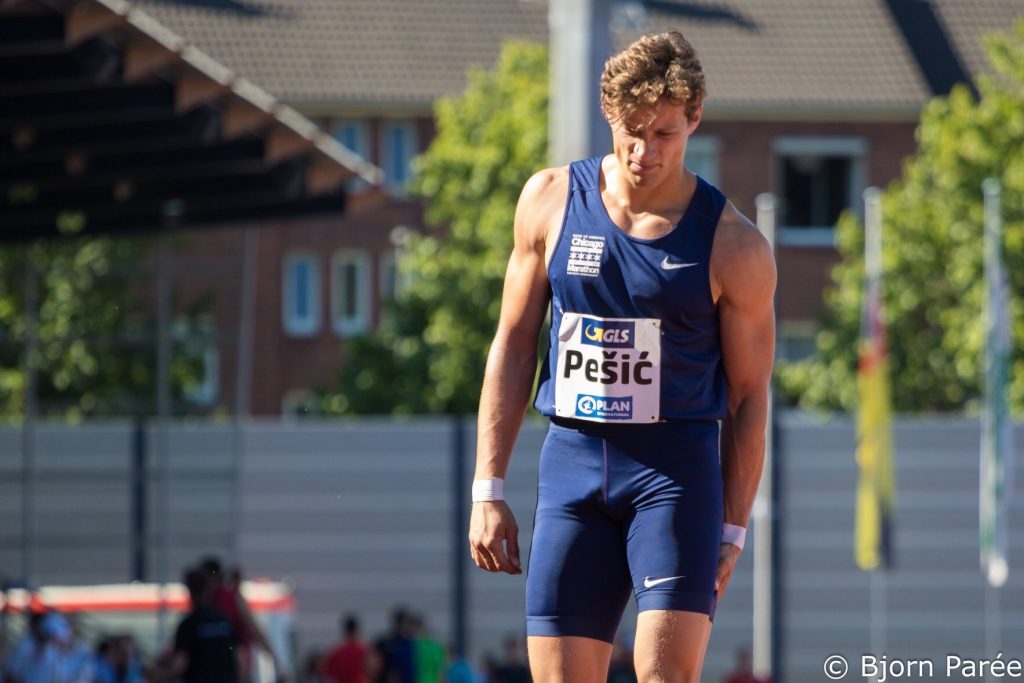
The Small State Games was actually the first time Darko had competed in Montenegro since 2011. Having to go abroad to find training facilities and competition has meant that Darko is not able to spend as much time as he would like inspiring those who are following in his footsteps. “People from my hometown understand that, of course, but younger kids couldn’t see me doing well. But the reaction after I competed at the European Indoors at Belgrade was huge. I don’t want to say I’m a big thing” – he totally is, he’s being modest – “but we had 30 kids in our club, and after my 6th place, we had 100. So, it grows fast.”
GOLDEN
Fast forward 6 months from the hamstring injury, and with months of strict rehabilitation behind him, Darko was ready to tackle the 2020 season. His first competition of the year was in Clermont Ferrand, at the annual X-Athletics meeting in January, and that’s where I caught up with him. Notwithstanding that his poles were stuck in Vienna, with the competition only a mere 5 hours away Darko seemed relaxed and very much looking forward to getting started. It was only the third heptathlon of his career, and his first multievent competition since 2018. How is he feeling about 2020?
“Everything’s fine. I’m 80% healthy, which is good.”
For a multieventer, with all the wear and tear of training, 80% healthy is not a bad position to be in.
“My coach Josef, he used to say ‘Darko – if you stay 80% healthy, you gonna be golden’. So, I’m golden!”
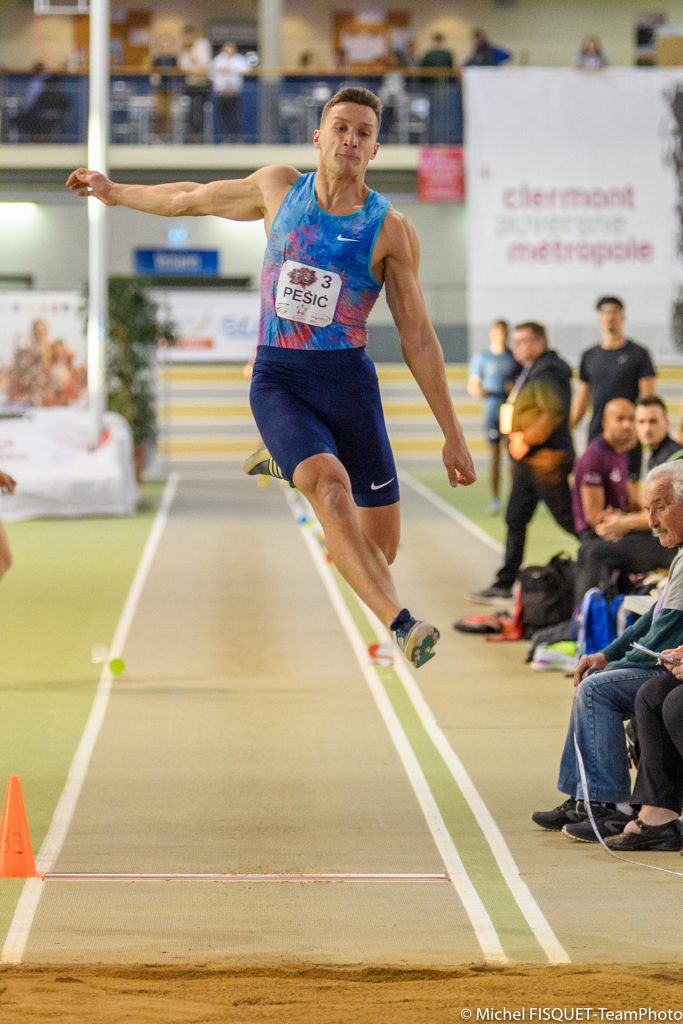
And save for a finger injury incurred in the hurdles warm up, Darko finished the competition in one piece, or at least with not too many health percentage points lost. The intention of the competition in France had been to seek qualification for the World Indoor Championships in Nanjing, still in the calendar at that point in January. With 6 places up for grabs, either through 2019-20 season high scores or a wildcard invitation, who knows what might have happened in China. In these strange times, emerging from the indoor season at 80% health seems like a good outcome.
Darko’s absence with injury has also meant fewer opportunities to see his friends and competitors. The stream of decathletes greeting him over breakfast in Clermont Ferrand shows just how popular he is on the circuit. First, Romain Martin. “He’s crazy in the pole vault”. Next, Simone Cairoli. “Simone is beating me 2-1. He beat me in Götzis. I beat him in Belgrade, and he beat me of course in Berlin. So now it’s my turn!” The next day Simone finished 4th, Darko in 6th place. With much of the 2020 season already written off for everyone, the Cairoli v Pešić rematch is going to have to wait.
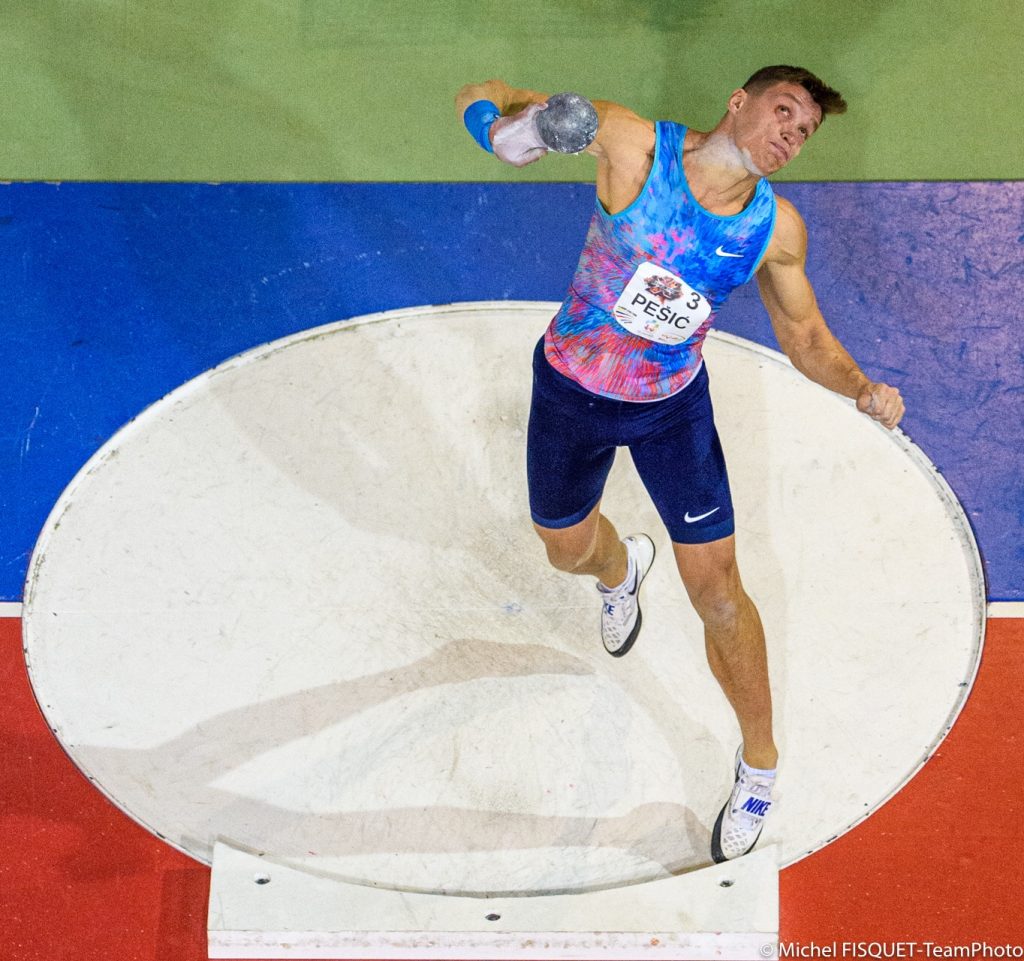
POINTS MEAN EVERYTHING
The Olympics have now been postponed, and World Athletics have given a commitment to expedite their review of the qualification system and advise of any changes to the process as soon as possible. But qualification for the Olympics has been something that has been preying on Darko’s, and other athletes’, minds. The new system not only considers the decathlon points score but includes bonus points for the meeting at which the score is achieved.
“Even if I get an invitation for, say, Götzis, I can’t go. Of course, the best athletes are going to be there, which I like. But what can I do if I’m in 10th place (with only 25 pts placing score)? It’s better to go to my national competition and win with 60 points even if I have to do it myself. In Montenegro, at a national championship in decathlon, it’s just going to be me. I’m not going to enjoy it as much as I would Götzis, or some other big competition. And I don’t have indoor facilities, like many other countries.”
“What they’ve done with the entry standards, it’s crazy. The Olympics entry standard is 8350 and only 8 guys have it, so I think it’s going to be a lot of trouble for the Olympics. I’m trying to work with my Federation to do a deal with Serbia, to combine our national championships in Belgrade. But for this to also be a Montenegrin championship, I have to beg two other guys to compete. And I have to pay for them to travel. It’s not a lot of money, but still, we have to think about it. I don’t want to have to think about it. I understand that they want to make national champs more popular, but some athletics cultures are very different from those bigger countries like Germany, France, even Switzerland. I don’t like it, but it is what it is, and we have to deal with it.”
80% OF PERFECT, 80% HEALTHY
The highest profile decathlete who does not yet have an Olympic qualifying mark, nor currently features high enough in the rankings to qualify is of course Kevin Mayer. Kevin has previously been outspoken about the impacts of the late season, night-time decathlon in Doha for athletes, but has also been instrumental in helping to create more opportunities for combined eventers. When Kevin speaks, people tend to listen.
“If we get multis in the Diamond League,” Darko says ” I say thank you to Kevin Mayer. Before him, even Ashton Eaton or Roman Šebrle were not able to achieve that. I like that France understands that, and hopefully other Diamond Leagues will understand that too. I hope it won’t just be the same athletes who would be invited to compete, but, even if it is, I still thank Kevin so much for what he’s doing. He’s a modern Che Guevara.”
Darko’s and Kevin’s experiences over the last decade have been very different, but they embarked on their careers as combined eventers at the same time, competing together both in Bressanone in 2009 and in Tallinn in 2011.
“When we were young, we competed in the same group in the 100m, because we were the slow guys” Darko recalls. In 2011 Darko’s 100m best was 11.84, Kevin’s a modest 11.23. “His progression has been amazing. I hope that he’s going to stay healthy and compete for many years. I was so sorry for him in Doha. Because he’s the guy who proved that in events where people say you cannot really improve, he improved so much. He’s the best technical decathlete I’ve ever seen. Everything that he does is 80% of perfect.”
Kevin might be 80% perfect, but Darko is 80% healthy and that means that he has 8000 points in his sights and a clear idea of what he needs to do to improve, and where his focus needs to lie.
“The simplest event, and my best event, is the shot put,” he says. ”It’s simple. You just have to go to the board and push the shot. Nothing else. No throwing, or anything” he waves his hands in the air dismissively “just push. The thing that I see a problem with is the pole vault. I’m powerful, so I can bend whatever you give me! But my technique is not very nice. And in long jump, either my landing is bad or I’m way too far behind the board. I just need good timing.”
Timing is everything. For now, the combined eventers of the world are having to be patient and improvise where they can. But that’s second nature for Darko. From high jumping over curtain rails as a kid to his status as multiple national record holder as a senior. From Montenegro to Serbia, to Sweden to Prague and back to Serbia. Dreaming and improvising. Combined events and cannonballs. Waiting for everything to finally come together, hit 80% and turn…golden.
Photo credits: Michel Fisquet (cover); all other photos Michel Fisquet, Olavi Kaljunen, Bjorn Paree
